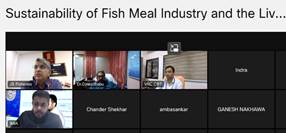
Department of Fisheries, Ministry of Fisheries, Animal Husbandry and Dairying, Government of India organized a national webinar on ‘Sustainability of Fish Meal Industry and the Livelihoods of Fishermen’ on 9th June 2023 as a part of ongoing celebration of Azadi Ka Amrit Mahotsav. The event was co-chaired by Shri Sagar Mehra, Joint Secretary (IF) and Dr. J Balaji, Joint Secretary (MF), Department of Fisheries (DoF), Government of India (GOI). The event was well-attended by fisher community representatives, exporters, entrepreneurs, fisheries associations, officials of Department of Fisheries, GoI and fisheries officials of different States/UTs, faculties from state agriculture, veterinary and fisheries universities, fisheries research institutes, fisheries cooperative officers, scientists, students and stakeholders from fisheries across the country.

The webinar started with the welcome address by Shri Sagar Mehra, Joint Secretary (IF), DoF (GOI). He highlighted that about 70 % of fish and crustaceans produced in aquaculture are fed with protein-rich feed wherein fish meal act as key ingredient. Fish meal is a highly concentrated nutritious feed supplement consisting of high quality protein, essential amino acids, vitamins, essential minerals (such as phosphorus, calcium and iron ) and other growth factors. Owing to its nutritional value, it is the preferred animal protein supplement in the diets of farm animals and often the major source of protein in diets for fish and shrimp. Each year, around 20 million tonnes of raw material are being used to produce fishmeal and fish oil. To initiate the technical discussions, he welcomed all panelists.
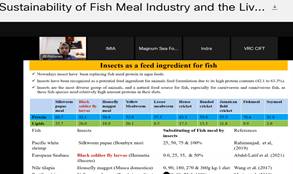
The technical session started with the discussion on topic ‘Overview of Fish Meal Industry’ by Mr. Nissar F. Mohammed, Managing Committee Member, CLFMA. He explained about importance of fish meal and how high quality fish meal can be produced. He explained that usage of fish waste in fish meal reduces water pollution and increases immunity in animals, reduces mortality in young lambs & piglets etc. The second speaker Mr Mohamed Dawood Sait, President, Indian Marine Ingredients Association, Bangalore spoke about Fish Meal Industry: Issues and challenges. He highlighted played a key role in bringing together fish meal and fish oil producers of India under one umbrella with the goal to promote the advancement and welfare of the fisheries industry.
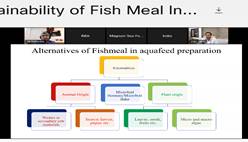
Shri A. Indra Kumar, Chairman and Managing Director, Avanti Feed Pvt. Ltd, spoke about Fish Meal and Shrimp Feed Industry that is going year on year. 95% of the shrimp aquaculture is being exported hence the ask of all importers is for products following sustainable aquaculture practices and marine trust. The topic ‘Fishmeal and its alternative to aqua feed industry’ was taken up by Dr. Ashish Kumar Jha , Senior scientist and Scientist In-Charge, Veraval ICAR-Central Institute of Fisheries Technology spoke about 3 issues of overfishing, bycatch and pollution and informed alternates like insects, leaves, fruits, seeds etc can be used as fish meal alternatives. Dr. A.P. Dineshbabu, Principal Scientist, ICAR-CMFRI spoke about Efforts for juvenile fishery mitigation in bycatch of Indian Marine Fisheries and suggested implementation of mesh size regulation, Juvenile Bycatch Reduction Devices (JBRD) and Minimum Legal Size (MLS).
Shri Ramacharya, Director Fisheries, Government of Karnataka urged that as about 12-18% fish going to waste hence the industry should be supported. He supported that awareness is being created through many platforms about the issue for correct policy measures and regulation just as the Karnataka government has put regulations on unregulated fishing.
Joint Secretary (MF) highlighted that importance of creating awareness and delving into the reasons for juvenile fish catching. He explained that establishment of artificial reefs should play a major role in addressing replenishment of fish that shall deter the catching of juvenile fishes. The floor was then open for discussion and was led by Dr J Balaji, JS (MF). Queries and doubts raised by fish farmers and industry representatives were discussed and clarified.
With the aforesaid insightful discussions, follow-up action points have been derived to further develop sectoral strategies and action plans. The webinar concluded with a vote of thanks proposed by Dr. S. K. Dwivedi, Assistant Commissioner (Fy), DoF to the chair, delegates, guest speakers and participants.



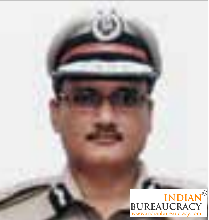
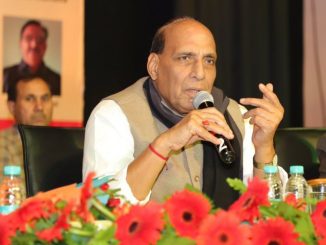
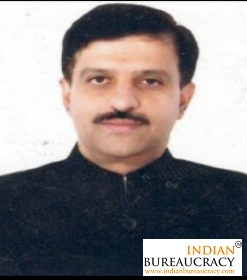
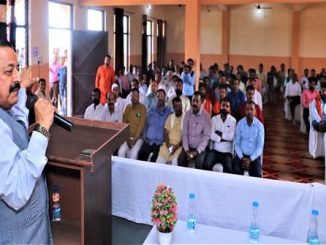
Leave a Reply
You must be logged in to post a comment.